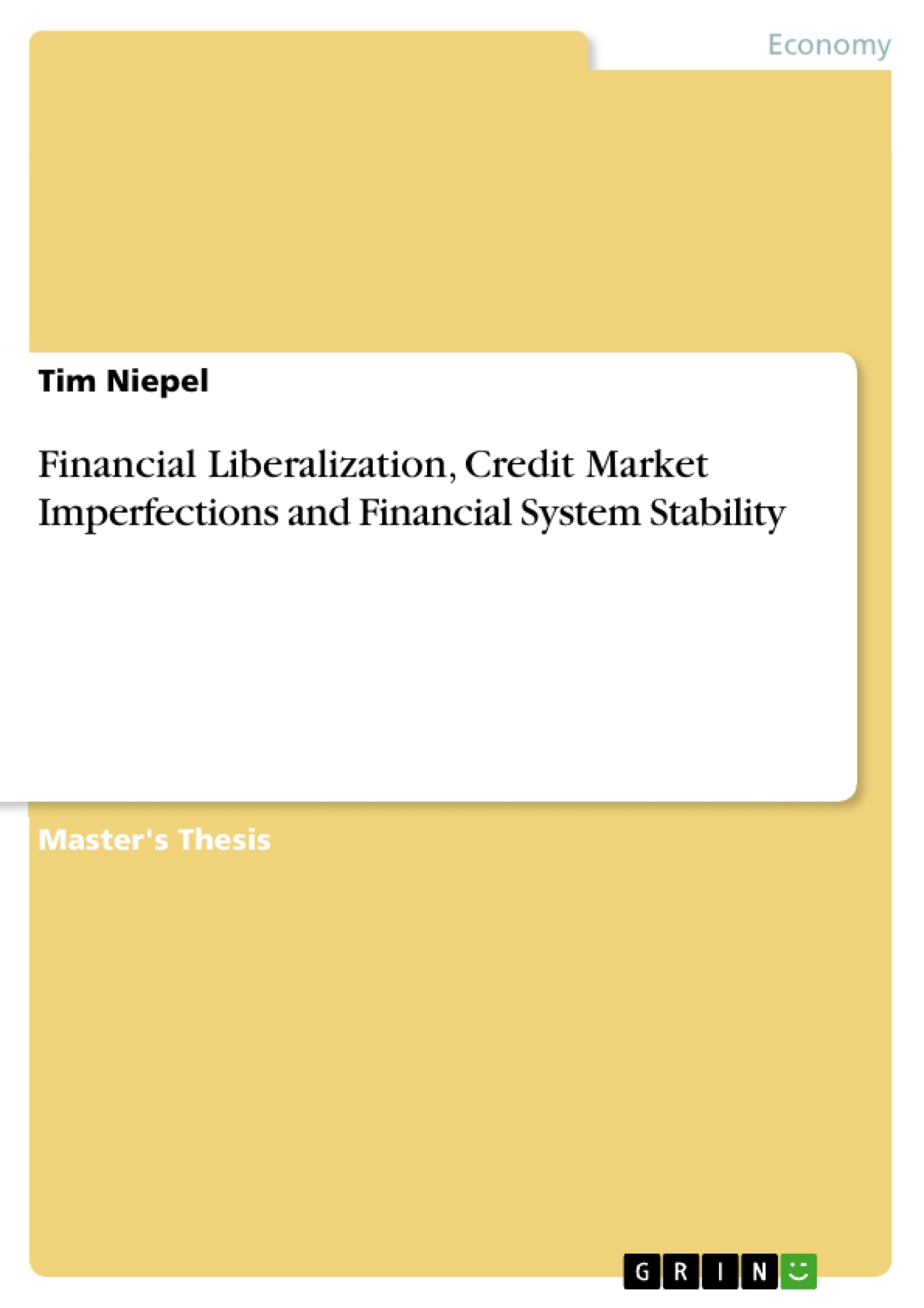
Financial Liberalization, Credit Market Imperfections and Financial System Stability
Masterarbeit, 2013
37 Seiten, Note: 1,5
Leseprobe
Inhaltsverzeichnis (Table of Contents)
- Introduction
- The Case of Bolivia
- Theoretical Framework
- Macroeconomic effects of financial liberalization
- Microeconomic effects of domestic financial liberalization
- Research question
- The Model
- Entrepreneurs
- Banks
- Credit default
- Optimal strategy
- Discussion
- Heterogeneous banking technologies
- The distribution of the individual cost to default
- Involuntary loan default
- Monitoring
- Provisioning
- Credit Bureaus
- Stylized Facts
- Limitations
- Conclusion and Policy Recommendations
Zielsetzung und Themenschwerpunkte (Objectives and Key Themes)
This paper explores the potential negative effects of financial liberalization on the stability of financial systems. The author argues that while financial liberalization can theoretically increase efficiency by promoting competition, it can also incentivize banks to accept higher default rates, leading to instability. The paper aims to contribute to the understanding of the relationship between competition and stability in financial markets, and to emphasize the need for regulation to ensure sustainable financial development.
- The impact of financial liberalization on credit market efficiency and stability
- The role of competition in influencing bank risk-taking behavior
- The potential for unregulated competition to lead to increased credit default rates
- The need for government intervention in the form of regulation to mitigate risks and promote sustainable financial markets
- The case of Bolivia as an example of the consequences of financial liberalization and the emergence of an over-indebtedness crisis
Zusammenfassung der Kapitel (Chapter Summaries)
The introduction sets the stage by discussing the historical context of financial liberalization and its theoretical justification. It highlights the potential benefits of increased efficiency but also acknowledges the emerging concerns about its impact on financial stability. The paper focuses on the case of Bolivia, which experienced an over-indebtedness crisis after implementing financial liberalization policies. The author argues that this crisis resulted from the changing lending methodologies of financial institutions in response to fierce competition. The paper then introduces a theoretical framework, outlining the macroeconomic and microeconomic effects of financial liberalization and the research question.
The model presented in the paper focuses on the relationship between credit default rates, lending methodologies, and competition. It examines how banks, as informed lenders, may choose to accept higher default rates in a competitive environment. The discussion section explores various extensions and variations of the model, considering factors such as heterogeneous banking technologies, involuntary loan default, and the role of monitoring and provisioning. It also examines the limitations of the model.
The final chapter concludes the paper by summarizing the key findings and offering policy recommendations. It emphasizes the importance of regulation to ensure sustainable financial development and to mitigate the potential risks associated with unregulated competition in financial markets.
Schlüsselwörter (Keywords)
The paper focuses on the key concepts of financial liberalization, credit market imperfections, and financial system stability. It examines the relationship between competition and risk-taking incentives of banks, particularly in the context of asymmetric information and endogenous credit default. The paper utilizes a theoretical model to analyze the potential for financial liberalization to lead to instability in financial markets. It also highlights the need for intelligent regulation to ensure the development of sustainable financial markets.
Frequently Asked Questions
How does financial liberalization impact credit market efficiency?
While it is intended to stimulate competition and increase investment efficiency, it can also create incentives for banks to accept higher default rates to stay competitive.
What is the link between competition and financial instability?
Fierce competition may lead banks to adopt riskier lending methodologies, which can result in systemic instability and over-indebtedness crises, as seen in the case of Bolivia.
Why is government intervention necessary in liberalized financial markets?
Intelligent regulation is required to mitigate the risks of unregulated competition and ensure the development of sustainable, stable financial markets.
What role do Credit Bureaus play in this model?
Credit Bureaus help address asymmetric information by providing data on borrower history, which can help banks manage risk and reduce default rates in a competitive environment.
What happened during the over-indebtedness crisis in Bolivia?
After financial liberalization, aggressive competition led financial institutions to change their lending practices, resulting in a widespread crisis where many borrowers could no longer repay their loans.
Details
- Titel
- Financial Liberalization, Credit Market Imperfections and Financial System Stability
- Hochschule
- Universiteit Utrecht (Utrecht School of Economics)
- Note
- 1,5
- Autor
- Tim Niepel (Autor:in)
- Erscheinungsjahr
- 2013
- Seiten
- 37
- Katalognummer
- V300068
- ISBN (eBook)
- 9783656972532
- ISBN (Buch)
- 9783656972549
- Dateigröße
- 563 KB
- Sprache
- Englisch
- Schlagworte
- financial liberalization credit market imperfections system stability
- Produktsicherheit
- GRIN Publishing GmbH
- Preis (Ebook)
- US$ 17,99
- Preis (Book)
- US$ 20,99
- Arbeit zitieren
- Tim Niepel (Autor:in), 2013, Financial Liberalization, Credit Market Imperfections and Financial System Stability, München, Page::Imprint:: GRINVerlagOHG, https://www.diplomarbeiten24.de/document/300068
- Autor werden
- Ihre Optionen
- Vertriebskanäle
- Premium Services
- Autorenprofil
- Textarten und Formate
- Services für Verlage, Hochschulen, Unternehmen

- © GRIN Publishing GmbH.
- Alle Inhalte urheberrechtlich geschützt. Kopieren und verbreiten untersagt.
- info@grin.com
- AGB
- Open Publishing
Der GRIN Verlag hat sich seit 1998 auf die Veröffentlichung akademischer eBooks und Bücher spezialisiert. Der GRIN Verlag steht damit als erstes Unternehmen für User Generated Quality Content. Die Verlagsseiten GRIN.com, Hausarbeiten.de und Diplomarbeiten24 bieten für Hochschullehrer, Absolventen und Studenten die ideale Plattform, wissenschaftliche Texte wie Hausarbeiten, Referate, Bachelorarbeiten, Masterarbeiten, Diplomarbeiten, Dissertationen und wissenschaftliche Aufsätze einem breiten Publikum zu präsentieren.
Kostenfreie Veröffentlichung: Hausarbeit, Bachelorarbeit, Diplomarbeit, Dissertation, Masterarbeit, Interpretation oder Referat jetzt veröffentlichen!
- GRIN Verlag GmbH
-
- Nymphenburger Str. 86
- 80636
- Munich, Deutschland
- +49 89-550559-0
- +49 89-550559-10
- info@grin.com
-









